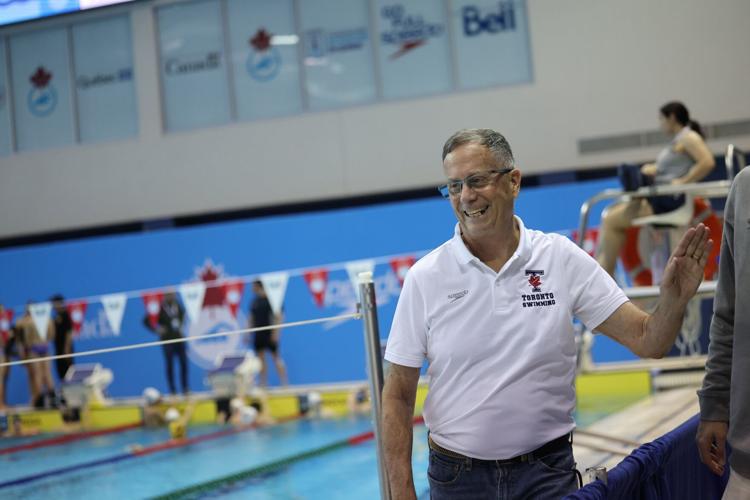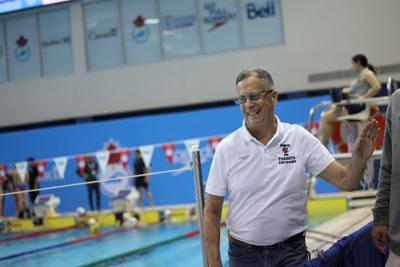Byron MacDonald is closing in on half a century in the broadcast booth as a swimming analyst for CBC so it’s understandable that he needs a moment when asked to name a favourite Olympic race.
“That’s interesting, possibly Alex Baumann winning the gold medal in the 400 (individual medley) in 1984,” he said.
“A, it was my first Olympics in television. And B, it was Canada’s first Olympic gold medal in 72 years. He was going in as the world-record holder so he was supposed to win and then, all of a sudden, the Brazilian kid started to make a move and it was like, yikes, it’s getting a little close here. And then Alex kind of put it away. That was a very exciting race.”
In what is now known as typical MacDonald style, viewers heard about a lot more than who was in the lead or that Brazil’s Ricardo Prado was the previous world-record holder and looking to get it back.
On the butterfly stroke, MacDonald said Baumann had gone to Italy to race his competitor in lane three, Giovanni Franceschi, and he “looked at Baumann in the warm-up and decided he didn’t want to swim him and left the pool area.”
On the breaststroke, viewers learned that the American in lane seven, Jesse Vassallo, “had knee surgery after playing a pickup game of basketball in Vancouver and his breaststroke is a little off.”
Summer McIntosh has been sharpened into something like a weapon since her Olympic debut at 14 in Tokyo. Legendary status is but a few swims away.
Summer McIntosh has been sharpened into something like a weapon since her Olympic debut at 14 in Tokyo. Legendary status is but a few swims away.
Paris is MacDonald’s 10th Olympics as a swimming analyst and so much has changed since his first live event, the 1978 Commonwealth Games in Edmonton. “The internet for one,” the 74-year-old said with a chuckle.Â
That makes collecting stories to sprinkle into his commentary a lot easier. What’s also changed, thanks to all the medals won in the pool in Rio and Tokyo, is that viewers in Canada are becoming used to seeing Canadian winners. In Paris, with ÎÚÑ»´«Ã½’s 17-year-old swimming phenom, Summer McIntosh, he even got to call the race for another Canadian 400-metre IM world-record holder and Olympic gold medallist on Monday.
What hasn’t changed is MacDonald’s approach to the job: Give people a reason to care who makes the final, touches the wall first or just misses the podium.
“Swimming is not a mainstream sport, I know that. We’re not ice hockey or baseball so this is the opportunity to sell the sport and, for me, I take that on very seriously.
“You like the sport more if you understand what’s going on — that’s a simple adage.”
He keeps the words of Steve Armitage, who was his play-by-play partner for two decades, front of mind. “He said you have to remember you’re not talking to your swimming friends, you’re talking to Fred and Ethel in Saskatchewan.”
MacDonald often mixes in a little history of the sport, such as how the butterfly stroke was created by breaststroke swimmers looking for a speed advantage, into his colour commentary. Or an explanation about why breaststroke is easy to do slowly and very hard to do fast.
But what’s included in every race are stories about the swimmers and tidbits about their lives outside the pool.
“I’ve had many people tell me that they absolutely love it because now they actually can identify with a certain athlete when they’re behind the blocks because they heard a story about them.”
Rob Snoek took on swimming play-by-play duties in Tokyo and is working alongside MacDonald again in Paris. “Byron’s voice has been so related and so connected to swimming for so long,” he said.Â

Byron MacDonald during practice at the media day for the Canadian Olympic trials.
R.J. Johnston ÎÚÑ»´«Ã½ StarMacDonald competed in the 1972 Munich Olympics (he was sixth in the 100-metre butterfly) and, after just missing the 1976 team, started coaching. He has been the head coach of the University of ÎÚÑ»´«Ã½ swimming program since 1978 and, right up until these Games, was on a streak of coaching a swimmer to every Olympic team.Â
Snoek was working with MacDonald at the Canadian Olympic swimming trials at the ÎÚÑ»´«Ã½ Pan Am Sports Centre in May. “He’d say to me at the trials, an hour before (broadcasting the finals), I’ve just to go downstairs and do some coaching.”
Inevitably, he came back with a little extra for the broadcast, having bumped into someone on the pool deck, Snoek said.
While the marquee women have built upon and soared upward from Penny Oleksiak’s breakout at the Rio Games, the men have lagged far behind.Â
While the marquee women have built upon and soared upward from Penny Oleksiak’s breakout at the Rio Games, the men have lagged far behind.Â
MacDonald has had the odd flub along the way.
At the 1994 Commonwealth Games, Curtis Myden had a three-second lead going into the freestyle portion of the 400 IM, he recalled. “With about 70 metres to go, I said, ‘You can bet your mortgage on this one.’ ” Then, with 15 metres to go, Myden looked like “someone punched him” and his Australian rival surged past for gold, leaving the Canadian in second.
“He got out of the water and fainted,” MacDonald said, launching into story mode. “Turns out … he had breakfast before he went to the pool for the prelims at 9 a.m. and then he stuck around afterwards to talk about his race, to talk to the coaches, to get a massage and by the time he went back to the village, he missed the meal time. He actually hadn’t eaten since eight in the morning, so he basically was on fumes.”
More recently, at the 2016 Rio Olympics, MacDonald uttered a few words he still wishes he could take back. In describing the swimming performance of a young Chinese relay swimmer to a colleague, not realizing they were still on air, he said she went out too fast and “died like a pig.”
Swimming started Saturday in Paris and goes until Aug. 4. MacDonald gets to the La Défense Arena at 8 a.m. for the preliminaries, which start at 11 a.m. (That’s 5 a.m. for those watching live from ÎÚÑ»´«Ã½). He hauls a couple of bags full of paper with him. He’s old school so he likes to print out all the notes he has collected on the world’s swimmers.
The finals don’t start until 8:30 p.m. in Paris but he stays at the pool to make sure he’s “crossed every T and dotted every I.”
The science behind the swimmer: How the dolphin kick is pushing Maggie Mac Neil to Olympic greatness
- Kerry Gillespie
He hand writes his own lane sheets, with space to include some notes for every swimmer in every race. He says he’s thrilled by all the races, whether there’s a Canadian in the race or not.
When a Canadian is in the medal hunt, though, “in the back of your mind you know that there’s a lot more people watching.”
MacDonald wraps up around 11 p.m. in Paris and heads back to the hotel for one beer before bed.
“I’ll do that for 10 straight days,” he said. “I can guarantee I will not see anything in Paris. The pool could be in Yellowknife and it wouldn’t make a difference to me.”



























To join the conversation set a first and last name in your user profile.
Sign in or register for free to join the Conversation